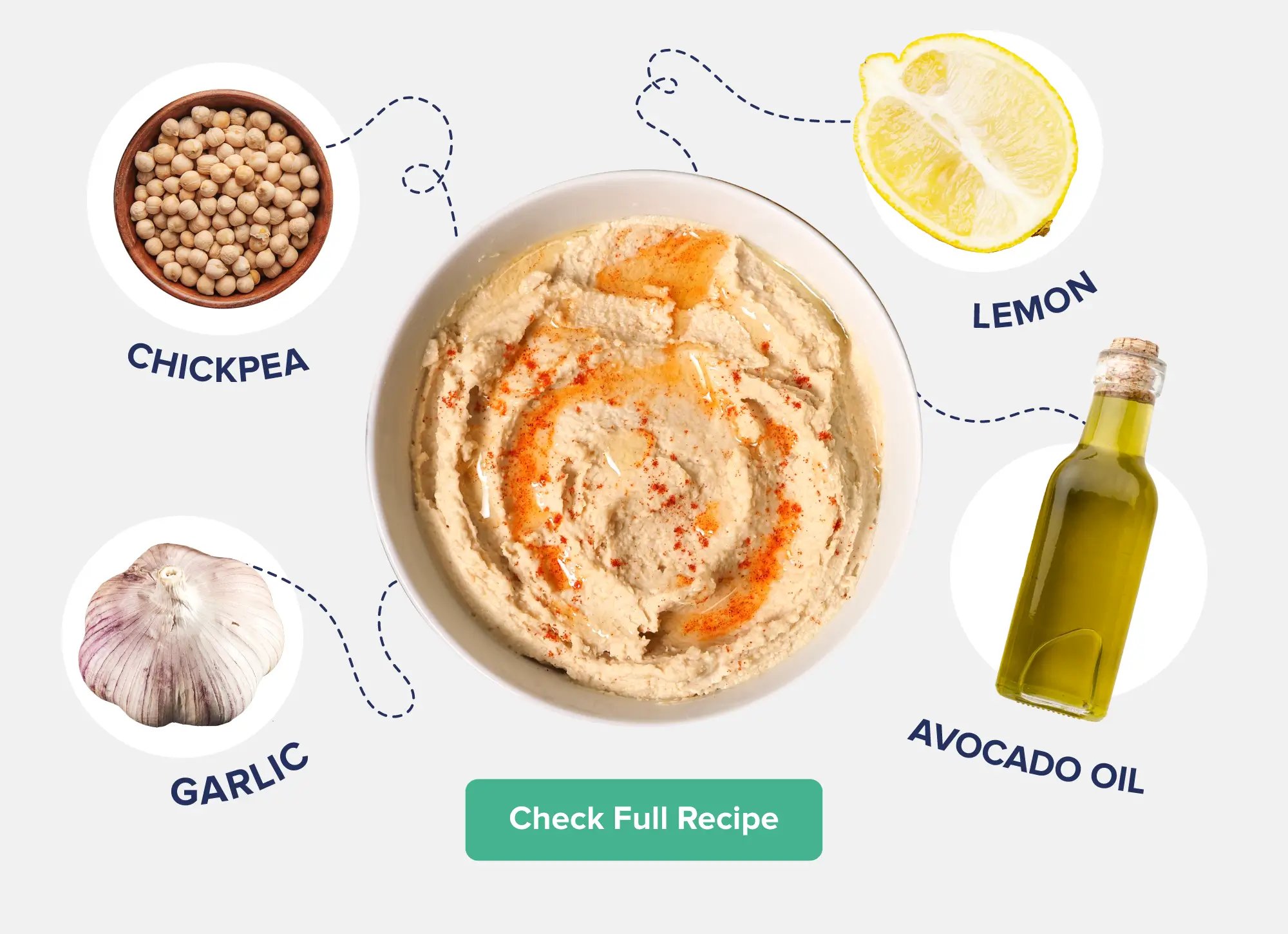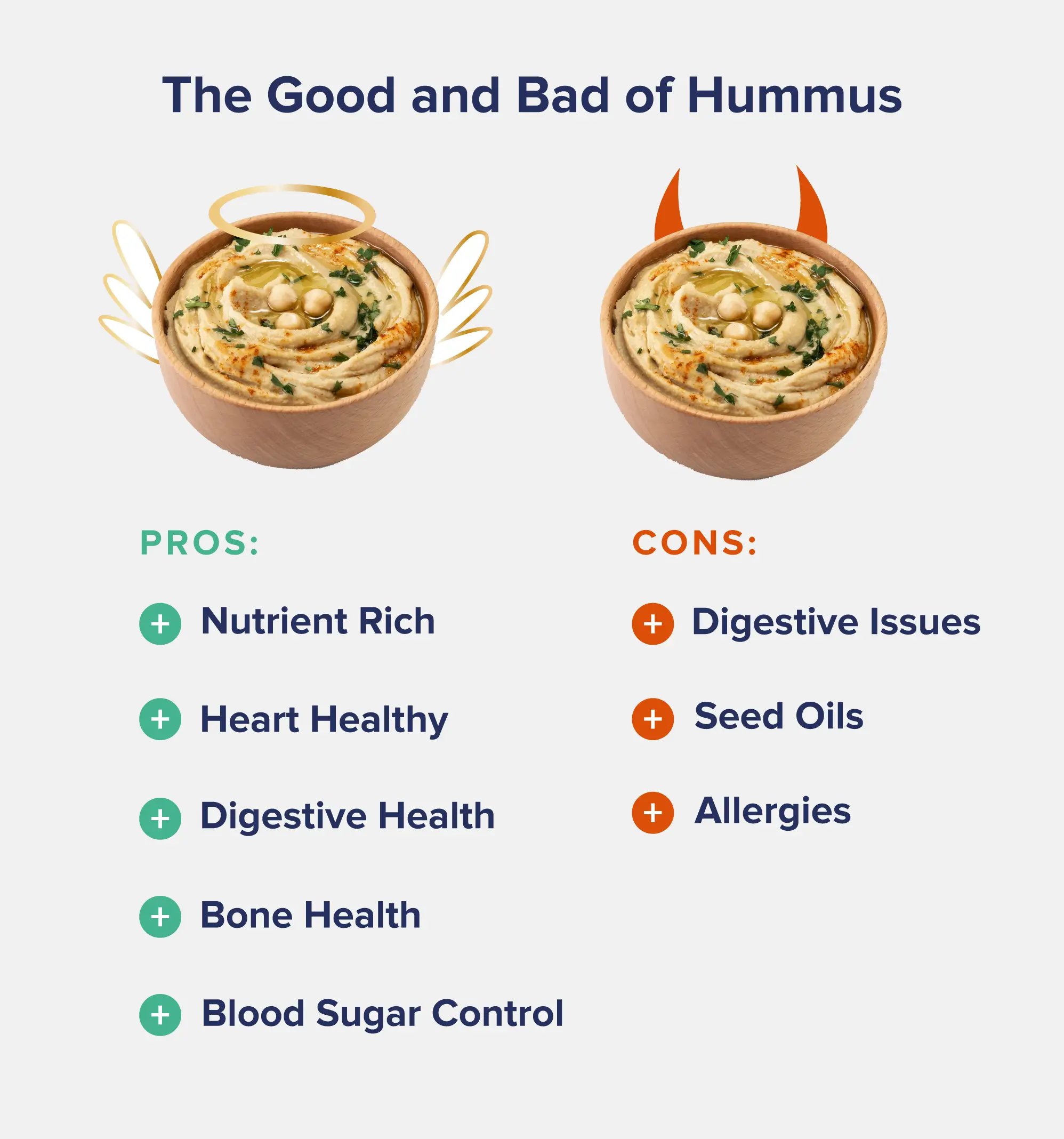Talk to a Registered Dietitian and use INSIDER20 for 20% off!
Talk to a real Dietitian for only $99: Schedule Now
This post contains links through which we may earn a small commission should you make a purchase from a brand. This in no way affects our ability to objectively critique the products and brands we review.
Evidence Based Research To fulfill our commitment to bringing our audience accurate and insightful content, our expert writers and medical reviewers rely on carefully curated research.
Read Our Editorial Policy
Picture this: You’re at a party surrounded by a tantalizing spread of snacks. Your eyes scan over tortilla chips and salsa; you look past the buffalo wings and spot it…the bowl overflowing with creamy hummus sitting next to crunchy raw veggies just waiting to be dipped in the mix.
You grab a carrot and are about to dive in because you’ve heard about the many health benefits of hummus, but you also remember the bad belly ache it gave you last time, so you hesitate.
Is hummus all it’s cracked up to be?
Hummus, the Middle Eastern superstar, has conquered snack tables and kitchen spreads worldwide. But is hummus healthy or not??
In a quest for answers, we’re diving deep into the hummus universe. Get ready to uncover the secrets of this chickpea-based delight as we explore its history, nutritional benefits, and any sneaky side effects it might be hiding in its creamy depths.
So grab your pita chips and your cucumber slices because we’re about to embark on a hummus-filled adventure. Let’s get to the bottom of this savory mystery!
Hummus is a traditional Middle Eastern dish made primarily of pureed chickpeas (aka garbanzo beans), tahini (sesame seed paste), olive oil, lemon juice, garlic, salt, and pepper. The chickpeas provide the protein punch, tahini adds a creamy richness, and the lemon juice and garlic kick up the flavor.
If you’re looking to make your own hummus at home with your trusty food processor, here’s a fast and easy recipe to get this creamy dip onto your table just in time for a snack attack. You in?
Yes, Chef!

Hummus traces its roots back to ancient civilizations in the Levant, where it was savored by Pharaohs and commoners alike. It’s more than a dip; it’s a cultural icon, a symbol of hospitality, and a staple on Middle Eastern tables.
In fact, there’s an age-old debate among nations about who makes the best hummus. We will let you make your own decision!
Hummus hits the macronutrient trio: Protein, carbohydrates and fat.
Protein: With about 2-3 grams of protein per tablespoon, hummus is a great plant-based protein source.
Carbohydrates: Complex carbohydrates are present to provide you with energy without a sugar rollercoaster ride. There are approximately 20 grams of carbs per 100 grams of hummus.
Fat: The fat mostly comes from olive oil/ extra virgin olive oil, providing you with heart-healthy fats to help lower disease risk and keep you fuller for longer. There are approximately 16 grams of fat per 100 grams of hummus.
You’ll also find iron, calcium, sodium, and fiber in this versatile spread.
This nutrient-filled dish has the opportunity for a wide range of nutritional benefits. Here are some top ways that the ingredients in hummus could do your body good.
Hummus is a high source of plant-based protein, fiber, and essential vitamins and minerals, including folate, iron, magnesium, and vitamin B6. This nutrient mix is vital for overall health and well-being.
The main ingredients in hummus are chickpeas and olive oil, which are heart-healthy foods. Chickpeas are packed with soluble fiber, which helps reduce bad cholesterol levels, while olive oil contains monounsaturated fats that can improve heart health and reduce heart disease.
The chickpeas in hummus are a high source of dietary fiber, which aids in digestion and promotes healthy gut health. Regular consumption of hummus can contribute to regular bowel movements and a reduced risk of digestive issues.
Tahini, a star player in hummus, is a good source of calcium, which is essential for strong bones and teeth. A dollop of hummus here and there could be beneficial for bone health.
Hummus has a low glycemic index, meaning it doesn’t cause rapid spikes in blood sugar levels. This makes it a qualified contender for those with diabetes or looking to maintain stable energy levels throughout the day.
While we just learned about some of the benefits of hummus, it’s always good to be mindful and aware of potential issues, which encompass digestive problems, the use of seed oils, and the potential for allergic reactions.
For some individuals, the combination of chickpeas and tahini can be hard to digest, leading to bloating, gas, and gastrointestinal discomfort. Soaking the chickpeas before making the hummus might help to alleviate this issue. Also, keep your portions small until you know how your belly is going to react.
Store-bought hummus can often contain seed oils like sunflower, canola, or soybean oil in addition to olive oil. These oils are high in omega-6 fatty acids and, when consumed in excess, may cause inflammation and an imbalance in the omega-3 to omega-6 ratio.
One study found that an imbalanced ratio can cause various health issues, including coronary heart disease. Make sure to read the labels if you want to avoid seed oils in your hummus.
Those with an allergy to sesame seeds (the key component of tahini) or other ingredients in hummus may experience an allergic reaction ranging from mild skin irritation to severe anaphylaxis. If you have a food allergy, you understand the importance of reading the ingredients list—and hummus is no exception.

Hummus can be a healthy addition to your daily diet due to it providing plant-based protein, fiber, and essential nutrients. However, because of the added fats like olive oil and tahini, be mindful of your portion sizes.
Hummus can be a valuable part of a weight loss plan due to its high protein and fiber content, which might help you to stay full longer. Pairing hummus with fresh vegetables gives you a balanced snack that could aid in weight management.
Hummus is typically not high in sugar. Commercially prepared hummus may contain added amounts of sugars for flavor balance, so it’s important to read the labels or make hummus at home.
While hummus offers potential health benefits, there are some disadvantages to consider. Overconsumption can lead to weight gain due to its calorie density, and for some, it may cause digestive discomfort. Store-bought hummus may contain additives or excess sodium, so reading the labels is important to help choose the one with the cleanest ingredient list.
Hummus is a versatile and nutritious food that offers protein, fiber, and healthy fats when made well and enjoyed in moderation. This Mediterranean-inspired dish has the potential to be a healthy addition to your daily menu, so grab those veggie sticks and dip away.